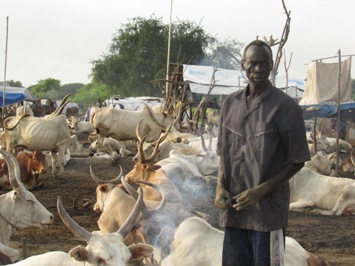Civilians capture South Sudan soldier during attempted cattle raid
April 10, 2015 (JUBA) – South Sudanese army (SPLA) troops deployed to protect villagers and their properties in Jonglei state’s Bor county are accused of raiding cattle and abducting children after one of their members was captured on Wednesday by armed youth.

Commissioner of Bor county, Isaac Mamer Ruuk, confirmed that the pro-government soldier was captured by the local armed civilian youth while raiding cattle, and his other colleagues managed to escape.
“[Kolnyang] youth were responding to attempted cattle raid and this captive [Juong] was captured after he was overpowered,” said Ruuk, in a telephone interview with Sudan Tribune from Bor capital on Thursday.
“Other two soldiers ran away and he [Juong] was holding a panga [machete] only and so he failed to deter the angry youth,” Ruuk added.
Bor county authorities blamed Murle tribesmen from Greater Pibor Administrative Area (GPAA) of being responsible for every raid and abduction in the state.
GPAA was established per a peace agreement last year between the former rebel leader David Yau Yau and the government, granting the ethnically Murle-dominated area a special administrative status under the presidency in Juba.
Ruuk said the captured cattle raider soldier is a Murle tribesman.
“We have been saying that all the insecurity in Greater Bor area is the work of Murle but they deny [it]. The capture of this man is another evident,” Ruuk explained, referring to Bor, Twic East and Duk counties inhabited by members of Greater Dinka Bor community.
SPLA spokesman Col. Philip Aguer, said investigations will be carried out to establish the circumstances under which national army soldiers turned into cattle raiders.
“It is a crime and if found guilty, then he will be punished according to the SPLA laws,” Aguer said in direct reference to the captured soldier.
Jonglei state police commissioner Maj. Gen. Thokul Ayom applauded the cooperation of villagers in responding promptly to the attacks.
“If such a cooperation exists between civilians and security forces, then it will be easy for police to identify suspected criminals and apprehend them,” said Thokul at a briefing to reporters in Bor town on Thursday.
The captured soldier was handed over to SPLA mechanized division in Bor town for further investigation.
Incidents of cattle and child abduction have increased recently in Bor county, including Monday 13 April where 80 cattle were raided from Jalle payam (district), the scene of January attack by suspected Murle tribesmen which left five people dead.
Local authorities have expressed worries that the past enmities between Murle and Dinka Bor may resurface followed the renewed cycle of violence induced by the desire for cattle raid and child abduction.
Both sides have been accusing each other of initiating the illegal child trade in the past. In 2012, a joint meeting in Pibor county between chiefs from both communities resulted to counter-accusations.
Members of the Bor community in the meeting said Murle ethnic group started the conflict when they resorted to abducting their children, but the latter counter-accused the former of initiating the sale of children to their communities in the past which the Murle said later on developed into child abduction by their members who had no cattle to buy children.
The situation was exacerbated by the recent accusations by Murle against Dinka Bor community alleging that the announced halt to road construction that was to connect Murle territory to Juba and Bor was influenced by Dinka Bor senior politicians in Juba.
Murle said the move was to deny their community benefits that would come with the road including access to trade routes. Government officials however argued that the road would affect wildlife preservation in the area.
Efforts to reconcile the two communities have so far yielded no fruits.
(ST)
